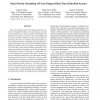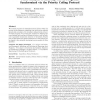27 search results - page 2 / 6 » Cooperative reasoning for preemptive execution |
SIGSOFT
2010
ACM
13 years 2 months ago
2010
ACM
Concurrent programs are notoriously difficult to debug. We see two main reasons for this: 1) concurrency bugs are often difficult to reproduce, 2) traces of buggy concurrent execu...
FMSD
2007
13 years 4 months ago
2007
Real-time embedded systems are often specified as a collection of independent tasks, each generating a sequence of event-triggered code blocks, and the scheduling in this domain ...
POPL
2011
ACM
12 years 7 months ago
2011
ACM
We consider programs for embedded real-time systems which use priority-driven preemptive scheduling with task priorities adjusted dynamically according to the immediate ceiling pr...
IJCAI
2001
13 years 6 months ago
2001
In the future, webs of unmanned air and space vehicles will act together to robustly perform elaborate missions in uncertain environments. We coordinate these systems by introduci...
PLISP
1989
13 years 8 months ago
1989
Speculative computing is a technique to improve the execution time of certain applications by starting some computations before it is known that the computations are required. A s...


